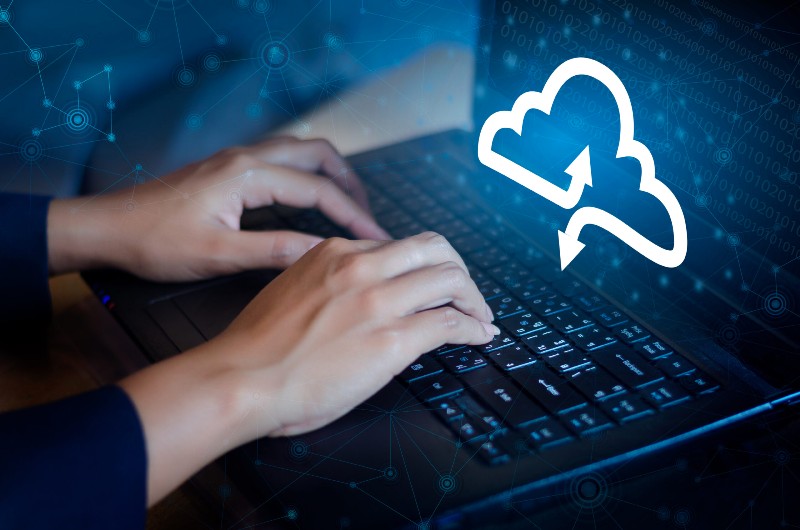
The cloud is a term used to describe computing resources available over the internet rather than on your machine. When you use a webmail service such as Gmail, Yahoo, or Hotmail, you unintentionally use a cloud service. This is where comes the Home Office based software according to DSGVO / GDPR.
The same is true if you utilize a storage service like Google Drive or Dropbox, which uses the power of many remote shared computer servers rather than storing the contents on your modest computer. As a result, the resources are said to be “in the cloud,” referring to the enormous Internet network at the Home Office Workplace. For data security this is a very important part.
The list of cloud tools is extensive; however, broad public utilities such as Google Apps, Google Calendar, Google Docs, and Microsoft Office 365 can also be mentioned. Personal services, such as on-demand listening services, are increasingly migrating to the cloud at the Home Office. For proper Security this is essential for the Workers and the employer.
Let it be mentioned that the cloud is not a new technological innovation. Such services with proper data security have been available for quite some time. However, it is becoming increasingly common, and it is primarily an economic novelty because the services are typically provided in the form of a subscription. The acronym “saas,” which stands for Software-as-a-Service (software as a service), suddenly appears to represent a tool that is no longer provided as a product that you purchase, but rather as a service at the Home Office Workplace. For each Employee you can expect the best now. This is the best of technical security for them in Virtual Private Network.
Understanding and Choosing Cloud Computing
The data can be stored in a private cloud, locally, in a company-specific place. This will necessitate a significant initial investment as well as long-term storage predictions. A private cloud also necessitates ongoing infrastructure upkeep at the organization’s expense at the Home Office Workplace. All the rules are adhered to here according to DSGVO / GDPR in Deutschland.
The open cloud
A public cloud data security can also be used to store information. This third-party company offers to host your systems on their servers in exchange for a monthly payment as your needs change. It is a service that is relatively adaptable at the Home Office. These are all the parts of the organizational measures. The best Companies are waiting to opt for it.
The SAAS and the IAAS are two accrediting organisations. There are numerous service types available to satisfy enterprises’ cloud computing demands. The Homeoffice based software fills up all the requirements with a secure password measures.
Software as a service (SAAS) refers to the use of software as a service. The software does not need to be installed on a computer and is accessed through a web browser. Online messaging platforms such as Gmail or Outlook are excellent instances of saas at the Home Office. This is the mobile Jobs system you can count on.
Infrastructure as a service (IAAS) refers to the utilization of infrastructure as a service. The company has computer resources that it hires out on an as-needed basis. The host manages all maintenance and hardware update activity. Platforms such as Microsoft Azure and Amazon Web Services (AWS) are examples of IAAS at the Home Office Teleworking. Smart access is essential here.
There are various benefits to using cloud computing:
- Saves time (remote work of collaborators via virtual offices, which allows flexibility, savings in time for exchanging various documents, printing, modification since everything is done in real-time). All the personal data are now present here.
- Cost savings (savings on-premises, software Security licenses due to pay-per-use on demand being less expensive overall than the cost of acquiring licenses, thin client), individuals can use it for free (for example, Gmail storage space) for Remote Work.
- Increased productivity (faster information interchange, improved collaboration where papers can be edited and shared faster than an email with attachments), access to apps and data from any computer (cybercafé, library), or smartphone
- Organizational Home office gain (software park consistency by no longer installing and updating the latest version on his PC but instead using the current version (for example, Salesforce, Google Apps), documents always up to date with collaboration and real-time data modification, data synchronization between data and online documents). For the safety this works fine.
And what about security?
In the event of an on-site Security disaster, the cloud computing service now allows you to avoid the fatal loss of computer data. However, it is still necessary to purchase additional data backup software. Finally, while selecting a cloud computing solution provider, the most significant point of vigilance should be confidentiality regarding data storage at the Home Office.
If you work in a technological field, the infrastructure in PaaS mode will better fulfill your needs. All are done perfectly with DSGVO.
It should be highlighted that the chosen solution can be easily modified to meet the functional requirements. If the latter becomes more significant (storage, bandwidth), it is frequently sufficient to subscribe to the superior formula without affecting the previously stored and used resources.
To summarise, cloud computing has advanced significantly and grown in strength since its inception in the 2000s. Today, it provides excellent opportunities for innovation and growth for businesses of all sizes from all fields of endeavor. On the other hand, it is critical to select the best solution for your needs and conduct a security audit of the various providers on the market.

